- Home
- Darrell Maloney
The Yellowstone Event: Book 6: The Aftermath
The Yellowstone Event: Book 6: The Aftermath Read online
THE
AFTERMATH
The Yellowstone Event:
Book 6
By Darrell Maloney
This is a work of fiction. All persons depicted in this book are fictional characters. Any resemblance to any real person, living or dead, is purely coincidental. Copyright 2019 by Darrell Maloney
This book is dedicated to Penny Fourpaws
Our loveable lug.
You’ve brightened a lot of lives and you’ll be greatly missed.
Rest in Peace.
Here are some fun facts about the
Yellowstone Caldera:
- It’s a real thing. It really does exist
- It’s a super volcano simmering just beneath the surface of Yellowstone National Park
- It has erupted in the past, and will erupt again
- Scientists believe that when it erupts again it will destroy 20 percent of the United States
- You do NOT want to be in that 20 percent
Bearing all that in mind, enjoy the book…
*****************************************
A BRIEF RECAP…
*****************************************
At first it sounded like a science fiction novel, and a bad one at that.
Many Americans thought it was a hoax, or a conspiracy dreamed up by big oil companies as an excuse to start drilling on federal land.
It wasn’t until noted scientists all over the world took to the news networks that American citizens finally accepted reality: a massive super volcano beneath Yellowstone National Park had awakened and was starting to stir.
“Yellowstone Caldera” became the most Googled search in history as millions who didn’t even know it existed days before clamored to learn everything they could about it.
The caldera had been around since the formation of the earth itself. It was the source of the popular park’s geysers and hot springs and mud pots.
All that heat had to come from somewhere.
It was just that nobody thought to consider the source might be a volcano capable of destroying the United States as they knew it.
Scientists were revealing far and wide that Yellowstone has blown several times before, and tended to come back to life every three hundred thousand years or so.
It was right around three hundred thousand years since she last blew her top.
Moreover, she was exhibiting the classic signs of pre-eruption activity.
Still, many weren’t concerned.
In the months preceding the announcement the world was mesmerized by the eruption of the Kilauea volcano on Hawaii’s big island of the same name.
Kilauea didn’t explode.
It didn’t kill anyone.
Well, except for an abandoned Ford Mustang.
Kilauea oozed magma from the volcano’s core, which turned into lava when it was finally exposed to air.
The fiery molten rock slowly made its way downhill, as lava typically does, and flowed into the Pacific Ocean.
Over the course of weeks the island became a little bit larger as the hot lava met cool water and formed brand new land mass.
The clash between hot and cold produced something else as well: what scientists called “lava bombs.”
Lava bombs were pieces of hardened lava, pea-sized to brick-sized, which exploded into the air by the thousands.
Some flew thousands of feet and came crashing down upon local kama'aina, pesky news media and even peskier tourists, causing a lot of damage.
But again, nobody died.
Many Americans put two and two together and came up with five.
They equated their most recent experience with a volcano with the one beneath Yellowstone. They assumed that one volcano is just like the next.
Scientists practically had to beg the populace to take Yellowstone seriously. One was not like the other, they said. When Yellowstone blew it had the potential to kill millions outright.
And everyone on the planet would be adversely affected in one way or another.
Nations scrambled in various ways.
Canada announced it would accept ninety thousand Yellowstone refugees from the United States.
On the face of it, it was a trifling offer, considering the number of those displaced would number in the tens of millions.
But Canada maintained it too would suffer from the eruption, in that its southern third would likely be buried in volcanic ash for years.
And it was a start, they said. There was nothing to prevent them from opening their doors and their arms again after the first ninety thousand were assimilated and settled.
Mexico, conversely, went the other way.
They announced to the world that their borders were closed to Americans. That American passport holders would be turned away at the gate. They couldn’t afford, they said, to take in a single refugee.
Their real motive, everyone north of the border believed, was vengeance for years of anti-immigrant sentiment from the Americans. There was serious talk of war from some quarters in Congress.
But no. War in the face of the largest natural disaster ever faced by man would do no one any good.
As for the rest of the world, countries began stepping up. Most wanted to present themselves as more like Canada and less like Mexico.
The United Kingdom agreed to take one hundred thousand refugees. Germany followed suit with a matching offer.
Even tiny Luxembourg, a friend of the United States since World War II, agreed to take four thousand. It was symbolic, sure. But those four thousand new Luxembourg citizens would find themselves greeted with open arms and open hearts.
When we last left them Tony and Hannah were in Phoenix, visiting with their dear friends Gwen and Melvyn. The four were beginning the process of moving to Alaska to take advantage of a new government program to relocate volcano refugees.
Julianna and her new love, “Deputy Dave,” were hard at work collecting off-the-gridders around the park and trying to coax them into evacuating.
Marty, Mike and Julie Sorenson, trespassing on park land, were enjoying having most of Yellowstone all to themselves after the evacuation left it almost deserted.
Ted and Linda Rogers, up until now stalwart believers that God would protect them from the volcano, finally decided perhaps God instead intended for them to heed the volcano’s warning.
They decided at last to take their young daughters and son and to leave the area, and to convince their equally headstrong neighbor Mamie Sellers to go with them.
Lastly our two traveling writers, Darrell and Rocki, were like salmon swimming upstream.
They were actually driving toward Yellowstone National Park, even as thousands drove south away from the pending eruption.
It was their intent to interview Julianna, for only she could provide the final link to a puzzling mystery: how her dead grandmother foresaw her role in what the whole world was now calling “The Yellowstone Event.”
And how, many years before, she sought out someone who might someday warn Julianna she’d be in danger. And that she must evacuate the area with everyone else… before it was too late.
In the last installment our characters were scurrying in all directions in their efforts to accomplish their respective missions.
And then the oddest thing happened.
Everything went dark and silent.
And now, the sixth installment of the series:
THE
AFTERMATH
Chapter 1
They’d come to a dead stop in the middle of Highway 22.
Directly before them was a wall of heavy steam, coming from a crack which extended the enti
re width of the highway.
They could see the superheated water was coming from a crack a mere inch or two wide.
They couldn’t go back, for the ground behind them seemed to be exploding beneath the wheels of their truck. Rocks were flying through the air by the thousands: various shapes and sizes, flying at varying velocities. The truck had been pelted several times already. The passenger side window and the back window were already shattered, the windshield cracked from one side to the other.
The men cowering in the back of the truck were already beaten and bruised.
A couple were bleeding, though not badly… yet.
Hours before the men had been naysayers and hangers-on. Steadfast men who’d professed they were in it until the very end.
They were preppers… survivalists… off-the-gridders who said that to die in the wilderness was better than to live in the city.
Now, to a man, they just wanted to get away from here fast.
The toughest housing project in the heart of Chicago was bound to be better than this.
The mountains and forests of Yellowstone were no longer their nirvana; no longer the prettiest place on earth.
It had instead become hell on earth.
An angry mistress bound to deal them all a horrible death.
No, they couldn’t go back, but presumably they could go forward.
Surely the wall of steam was just that: a wall, only an inch or two thick, and therefore something their vehicle could penetrate.
Dave weighed his chances of merely speeding through the wall of steam. At full speed it would take them only a second or so to burst through it and onto the other side.
It wasn’t like hitting a brick wall. Steam was hot, but had little substance.
It would give. It wouldn’t hold them back. It would cave in front of the oncoming truck and get out of its way.
The question was, what would happen in that second or two that the steam and the truck made contact?
Would the superheated water be hot enough to make the fuel tank explode? Not likely, Dave thought. Of course, he never paid attention in science class and didn’t even know if gasoline could be detonated by high temperatures emanating from a water source.
More likely, in Dave’s mind, was that the steam would drown the engine and cause it to die.
Would it damage it so badly he wouldn’t be able to get it started again?
That would doom them to a certain death, for the battering of rocks from the heavens showed no signs of letting up.
The heavily dented cab roof above their heads was starting to crack and would certainly come crashing in upon their heads as soon as a rock of any substance hit it.
The men in the back were even worse off, for they were being pelted unmercifully.
If they ran through the wall of steam and their truck died they’d almost certainly die.
If they turned back they’d almost certainly die.
“Crap,” Dave muttered.
The odds were against them either way.
Julianna took his hand and said, “We have no choice, honey. Going through is the only chance we have.”
“I know,” he answered.
He punched the gas and the truck lurched forward.
A couple of seconds later they passed through the steam curtain with seemingly little effect.
Oh, they felt the extreme heat as they passed through it, but it wasn’t as bad as they’d thought.
Julianna looked through the shattered rear window at the men in the back, not knowing whether they’d be scalded to death, with large swathes of skin hanging from their bodies.
What she saw was exactly what she’d seen before they’d gone through: men in agonizing pain trying their best to shield their bodies from further assault. But no severe burns.
“They seem to be okay,” she said as they drove at high speed down the highway.
He squeezed her hand.
He tried to smile.
For the first time he allowed himself to feel hope.
Hope that they’d make it.
Hope that they’d get out without any of them getting killed.
Hope they’d get the evacuees to the County Line Aid Station.
He stole a look at Julianna and saw the worried look on her face.
It was less than eight hours since he told her he loved her for the first time.
Eight hours since he could first envision a long life with her.
They’d entered a new stage in their relationship.
He felt he now had an affirmative duty not only to protect her from harm, but to comfort her as well.
And she was in a very bad place.
“See? I told you it was a piece of cake.”
She scoffed.
“You most certainly didn’t say that.”
“Sure I did.”
Both of them turned their attention back to the road in front of them, just in time to see a brilliant flash.
The deafening roar was something they heard for only a fraction of a second; well after they were forever blinded.
They didn’t know what was happening.
In less than a second they were blinded, then deafened, then blasted into dust in a horrific explosion the likes of which was never before witnessed by man.
In less than the blink of an eye they were gone.
Chapter 2
They were called “Atomic veterans.”
It was one of the biggest blights on the United States military in the twentieth century.
And most people have never heard of them.
In the years immediately following the close of World War II the country was in an all-out race against Soviet Russia to build bigger and better atomic, then nuclear weapons.
That much was understood and accepted by the public. After all, no one wanted to learn to speak Russian and to live in a land first blown apart, then occupied by a communist regime.
What wasn’t okay… what wasn’t acceptable… was that United States military leaders knowingly and shamefully put their men in harm’s way during the testing process.
Today a surprising number of Americans aren’t even aware of the Atomic veterans’existence.
Perhaps that would be better stated: a large number of Americans today aren’t aware such heroes existed or the nature of their passing, for there are precious few of them left.
In the post war years, in the Nevada desert, battalions of United States Marines and Army soldiers were marched to within a mile or two of ground zero. They personally witnessed atomic bomb tests, and endured blasts powerful enough to knock them off their feet and send them flying.
They were told not to worry.
That they were there just to find out if it was possible for an American fighting man to be knocked down by a blast wave… temporarily blinded by a brilliant flash of light… temporarily deafened by the roar of a thousand freight trains… and regain his composure enough to keep on fighting.
They were volunteers, in the same manner GIs of that era were always volunteers.
A sergeant would call his troops to attention and walk down the rank saying, “I need three volunteers. You, you and you…”
In some cases commanding officers “volunteered” an entire platoon.
It was common practice to downplay the potential risks.
“You’ll see stars for a couple of days. Your ears will ring for a week or two. After that you’ll be okay.”
Nothing was ever said about the long-term effects of radiation exposure.
And to be sure, most of those sergeants choosing volunteers; and indeed most of the commanding officers, had no clue of the problems the radiation would cause their men later in life.
But the generals knew.
The scientists knew.
The Pentagon knew.
And Washington did too.
The nation was in an era of hypersensitivity. It was the time of loose lips sinking ships and the giant red horde lurking just over the horizon.
/>
We’d already won the big one. But there was the sense there was something even bigger to come.
It was said that the capability now existed for the Soviets to wipe the United States off the map without ever setting foot on our shores.
Under such conditions the powers that be… meaning those in Washington who were bound by their oath to protect American citizens, conned the brave men who’d already fought their wars for them, so that the congressmen and senators’ sons largely got a pass.
“There’s no danger involved, other than a temporary loss of vision and hearing and a temporary unsteadiness.”
But they knew.
All of them were marched into harm’s way. All of their bodies absorbed harmful amounts of radiation.
The higher ups and so-called government “doctors” rationalized their participation by convincing themselves the amount of radiation wasn’t lethal. That it might cause problems later on, but those problems had to be catalogued and studied too.
And that supposedly made it “all right.”
The sad fact was, those in Congress who authorized the use of the Atomic veterans to be guinea pigs were traitors to their nation. They were no more Americans than Hitler and his ilk.
The same was true of the generals who carried out their orders. And the scientists who recorded the ensuing medical problems faced by the veterans in the years following their exposure.
All of them should have been forced to stand trial for what they did. If it was verified they were complicit in the program they should have had their “American card” taken from them and been banished to a desert island far from the Land of the Free.
What they did to the Atomic veterans was shameful and as un-American as any other act ever performed.
It wasn’t until Congress passed the Radiation Exposure Compensation Act in 1990 that anyone started efforts not only to honor the Atomic veterans for their service, but also to make amends.
The program came with a caveat, though.
Veterans were warned not to play the system. They were told that if they claimed to be Atomic veterans to take advantage of the compensation they’d damned well better be able to prove it.

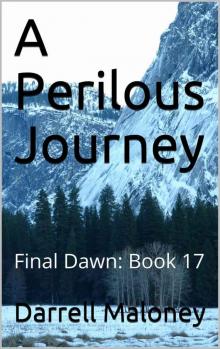 A Perilous Journey
A Perilous Journey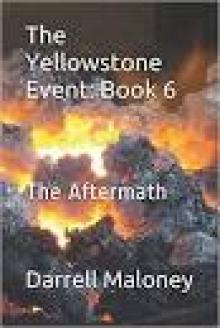 The Yellowstone Event: Book 6: The Aftermath
The Yellowstone Event: Book 6: The Aftermath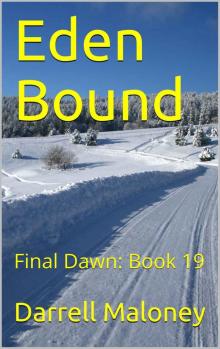 Eden Bound
Eden Bound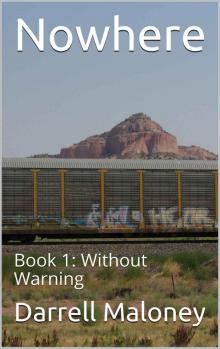 Without Warning
Without Warning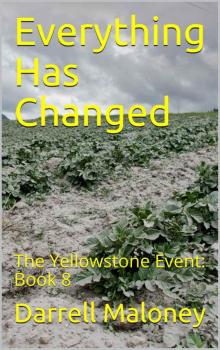 Everything Has Changed
Everything Has Changed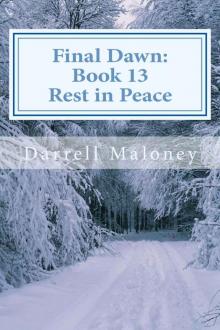 Rest in Peace
Rest in Peace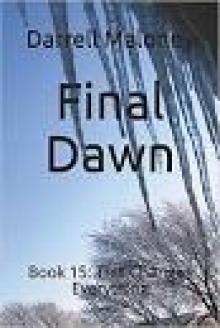 This Changes Everything
This Changes Everything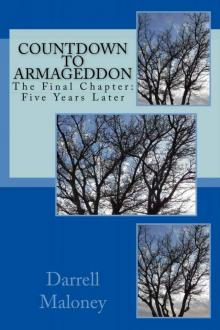 The Final Chapter
The Final Chapter It Can't Be Her
It Can't Be Her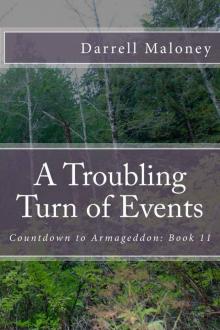 A Troubling Turn of Events
A Troubling Turn of Events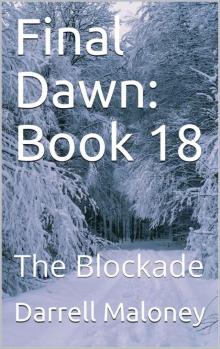 The Blockade
The Blockade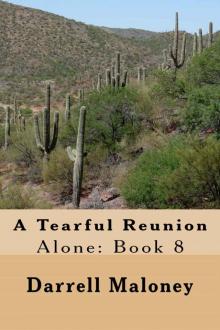 A Tearful Reunion
A Tearful Reunion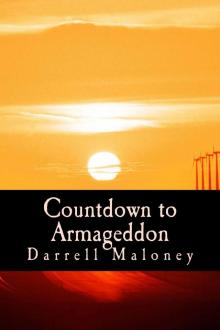 Countdown to Armageddon
Countdown to Armageddon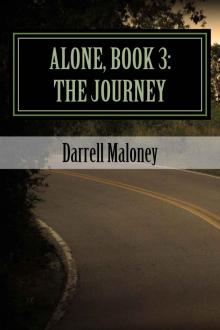 Alone, Book 3: The Journey
Alone, Book 3: The Journey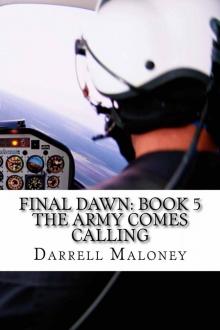 The Army Comes Calling
The Army Comes Calling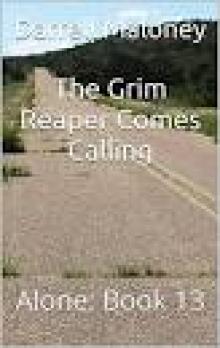 The Grim Reaper Comes Calling
The Grim Reaper Comes Calling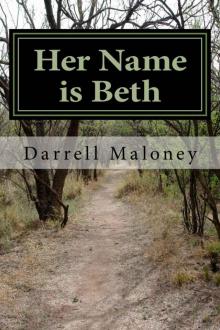 Her Name is Beth: Alone: Book 5
Her Name is Beth: Alone: Book 5 Red: The Adventure Begins
Red: The Adventure Begins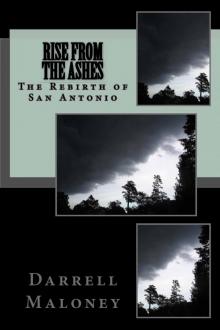 Rise From The Ashes: The Rebirth of San Antonio (Countdown to Armageddon Book 3)
Rise From The Ashes: The Rebirth of San Antonio (Countdown to Armageddon Book 3)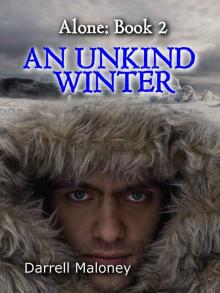 An Unkind Winter (Alone Book 2)
An Unkind Winter (Alone Book 2)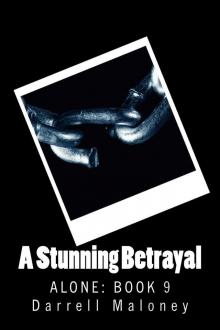 A Stunning Betrayal: Alone: Book 9
A Stunning Betrayal: Alone: Book 9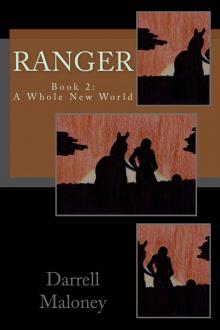 A Whole New World: Ranger: Book 2
A Whole New World: Ranger: Book 2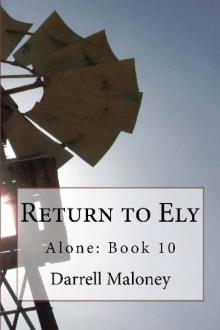 Return To Ely
Return To Ely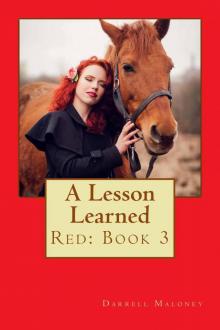 A Lesson Learned: Red: Book 3
A Lesson Learned: Red: Book 3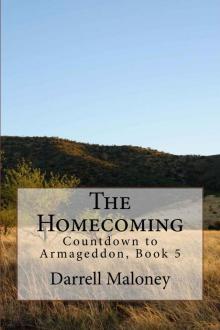 The Homecoming: Countdown to Armageddon: Book 5
The Homecoming: Countdown to Armageddon: Book 5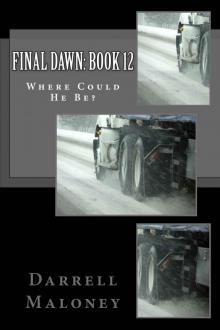 Final Dawn: Book 12: Where Could He Be?
Final Dawn: Book 12: Where Could He Be?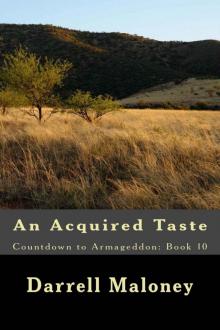 An Acquired Taste
An Acquired Taste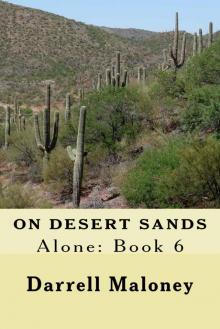 On Desert Sands: Alone: Book 6
On Desert Sands: Alone: Book 6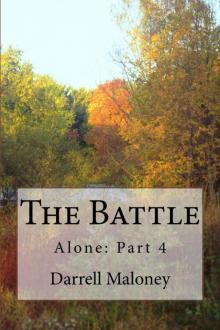 The Battle: Alone: Book 4
The Battle: Alone: Book 4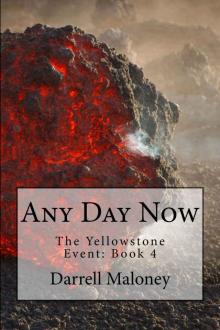 Any Day Now
Any Day Now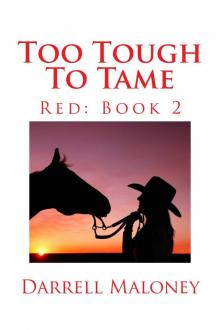 Too Tough To Tame: Red: Book 2
Too Tough To Tame: Red: Book 2 No Help From Austin: Red: Book 5
No Help From Austin: Red: Book 5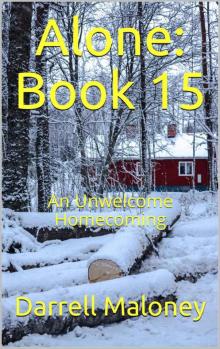 An Unwelcome Homecoming
An Unwelcome Homecoming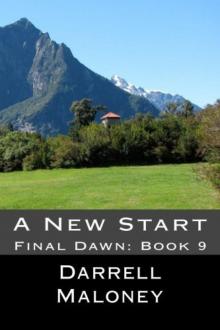 A New Start: Final Dawn: Book 9 (Volume 9)
A New Start: Final Dawn: Book 9 (Volume 9)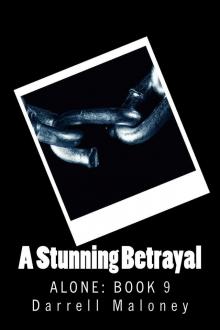 A Stunning Betrayal
A Stunning Betrayal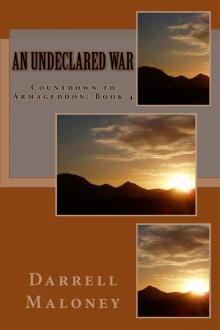 An Undeclared War (Countdown to Armageddon Book 4)
An Undeclared War (Countdown to Armageddon Book 4)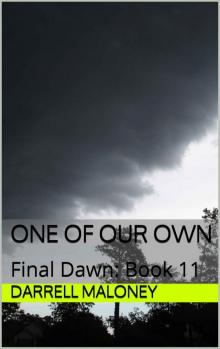 One of Our Own: Final Dawn: Book 11
One of Our Own: Final Dawn: Book 11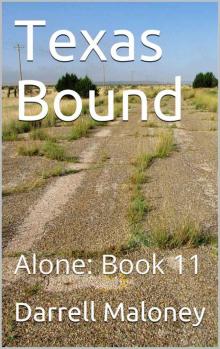 Texas Bound: Alone: Book 11
Texas Bound: Alone: Book 11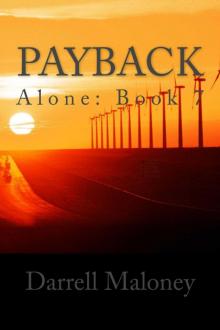 Payback: Alone: Book 7
Payback: Alone: Book 7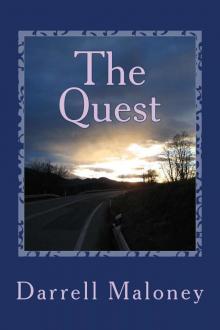 The Quest: Countdown to Armageddon: Book 6
The Quest: Countdown to Armageddon: Book 6 The Siege
The Siege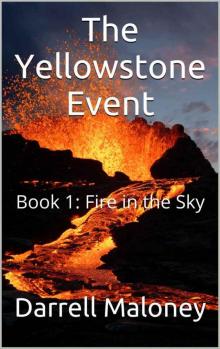 The Yellowstone Event: Book 1: Fire in the Sky
The Yellowstone Event: Book 1: Fire in the Sky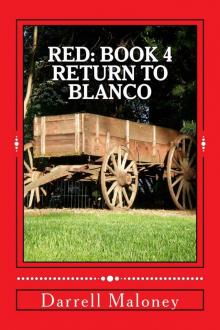 Return to Blanco (Red Book 4)
Return to Blanco (Red Book 4)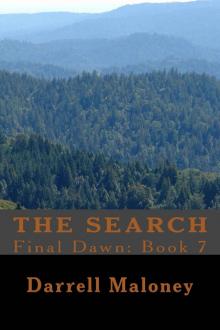 The Search
The Search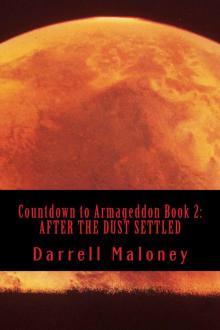 AFTER THE DUST SETTLED (Countdown to Armageddon Book 2)
AFTER THE DUST SETTLED (Countdown to Armageddon Book 2)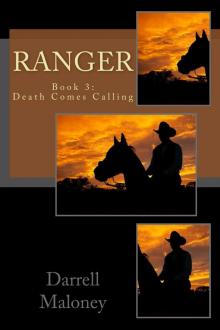 Death Comes Calling (Ranger Book 3)
Death Comes Calling (Ranger Book 3)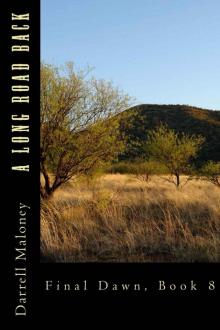 A Long Road Back: Final Dawn: Book 8
A Long Road Back: Final Dawn: Book 8